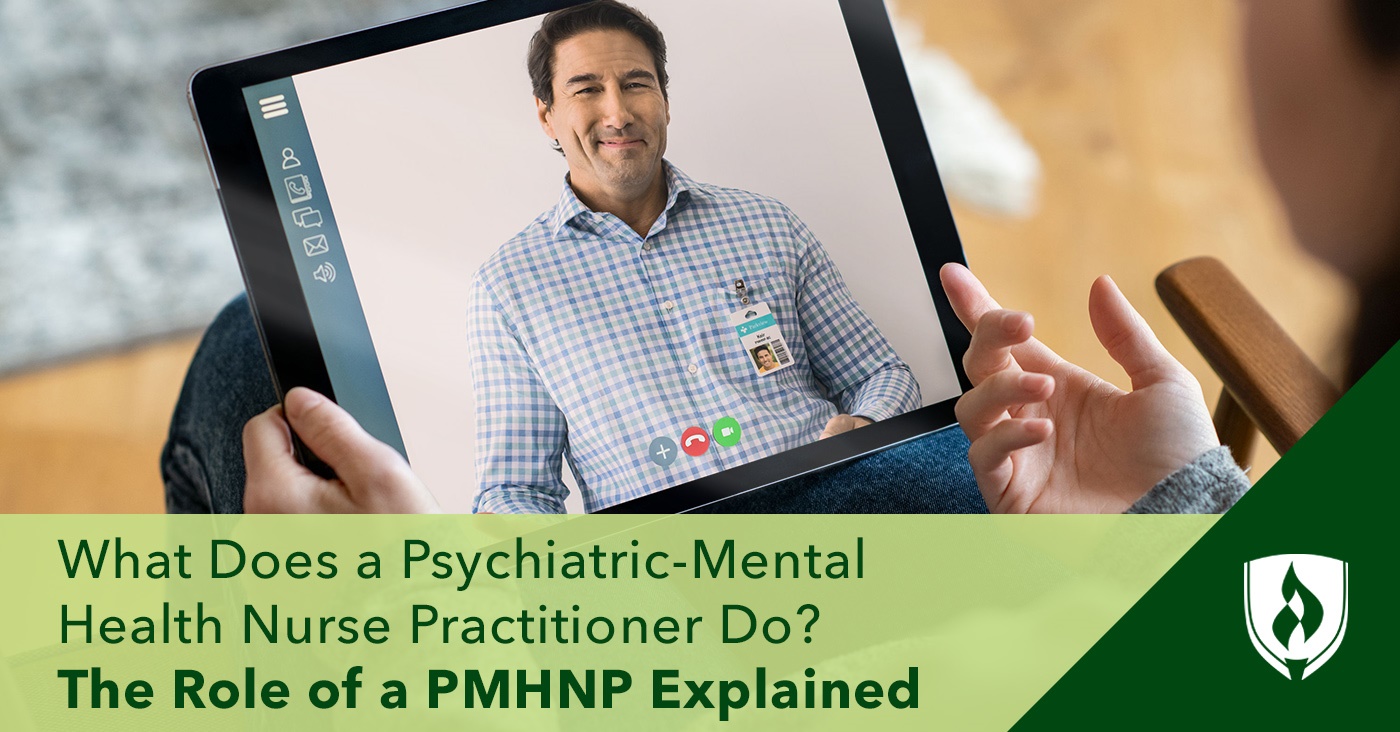What Does a Psychiatric-Mental Health Nurse Practitioner Do? The Role of a PMHNP Explained
By Kirsten Slyter on 02/28/2022

Mental health illnesses are arguably some of the most challenging conditions to treat. They’re not as obvious as an open wound or torn muscle, and there won’t necessarily be any evidence of them on any imaging. It takes a special kind of attention and training to diagnose and treat mental health illnesses and conditions.
In the U.S., almost 20% of adults and about half of adolescents struggle with a level of mental illness.1 Combine that with the increased need for mental health care during the COVID-19 pandemic, and it’s no surprise mental health professionals are badly needed—and psychiatric-mental health nurse practitioners (PMHNPs) can play a big role in providing that help.
PMHNPs combine their experience in nursing with their in-depth training in mental health care to holistically address patient needs. If this sounds intriguing to you, keep reading to get a better handle on this important role in mental health care.
A closer look at the PMHNP job description
PMHNPs can diagnose and treat any and every psychological condition, from mood disorders like depression and bipolar to others like dementia, eating disorders and addiction. The way they treat the disorders depends a lot on the individual patient. This need for highly individualized treatment sits well with their nursing background, as registered nurses are trained in the holistic nursing model. This approach teaches them to see the patient as a whole being, going beyond just symptoms and a diagnosis to integrate the patient’s strengths and their support systems. With an expanded scope of practice, PMHNPs can build on this holistic approach as they diagnose and treat patients.
PMHNPs can conduct patient assessments, diagnose conditions, guide therapy sessions and prescribe medications. They also educate patients and their families and coordinate care between other healthcare areas are the patient needs. While there’s some overlap with the duties registered nurses are familiar with, it can still be a large transition.
“Transitioning to working as an NP is a huge shift of thinking from working bedside to managing and coordinating care,” says PMHNP student Brett Springsted.
Depending on the facility or setting, a PMHNP may focus this work on a specific subset of patients like children, the elderly, veterans or people with substance abuse issues—all of which require a nuanced approach for effective care.
Can a psychiatric-mental health nurse practitioner prescribe medication?
PMHNPs can prescribe medication in all 50 states. While some states allow NPs to have full practice authority, other states require physicians to supervise NPs, with the level of required oversight varying from state to state. Some states require NPs, like physicians, to enroll in prescription drug or controlled substance monitoring programs designed to combat the ongoing opioid epidemic.
While having the expanded authority to prescribe medication is an important piece of the practitioner’s toolkit, there can be some perceived drawbacks. Springsted notes that PMHNPs can sometimes feel like they’re “medication managers” as they help patients find the right balance of treatments. That said, PMHNPs are trained in psychotherapy, and their day-to-day will depend heavily on the setting they practice in—some are much more therapy-intensive than others.
Considering PMHNP work settings
PMHNPs can find work in a variety of settings. Common options include behavioral health/addictions clinics, psychiatric mental health facilities and private nurse practitioner clinics. They may also work in hospitals, trauma centers, correctional facilities and substance abuse programs. In states that give full practice authority to NPs, they can even open their own practices.
The COVID-19 pandemic has also had an impact on where PMHNPs practice. With the popularity and adaptation of telehealth rising dramatically during the pandemic, more PMHNPs have been able to conduct their work via remote telemedicine appointments. This embrace of telehealth can be a boon for patients who live in remote areas where access to care can be a limiting factor.
PMHNP job outlook
Like with other healthcare roles, there’s a strong demand for nurse practitioners being driven largely by an aging baby boom generation. Employers are increasingly turning to healthcare professionals like nurse practitioners and physician assistants to help meet the needs of an aging population and to replenish the ranks of retiring healthcare providers. Overall employment for nurse practitioners is projected by the BLS to increase by 45 percent between 2020 and 3030.2 While this does mean there should be plenty of job opportunities available for qualified PMHNPs, it also means that PMHNPs have the potential to be stretched thin in their work.
Is PMHNP a good career?
As mentioned above, the overall workload of a PMHNP can be challenging for some—particularly given how complex and time-intensive mental health treatments can be. According to the American Association of Nurse Practitioners, full-time PMHNPs see about 15 patients per day.3
While no career is perfect, working as a psychiatric mental health nurse practitioner can be very rewarding. Though it can certainly be high stress with patients in intense situations and feeling a lot of challenging emotions, PMHNPs get to help patients develop the tools needed to deal with emotions and tough life situations in a healthy way. With the right coping skills and outlets, PMHNPs can use those same techniques to help themselves cope with the stress and potential burnout.
“With these challenges comes the great joy of overcoming obstacles and providing great care to patients in a very hard time,” says Alysha Woods, MSN, PMHNP-BC. “Being a PMHNP is such meaningful work—I wouldn’t choose anything else!”
Do you have a future as a PMHNP?
If you have a compassionate nature and interest in helping individuals dealing with mental illness, you might be drawn towards becoming a psychiatric-mental health nurse practitioner. You’ll find a challenging but rewarding career. If you want more details on the road to becoming a PMHNP, learn more in our article “How to Become a Psychiatric-Mental Health Nurse Practitioner: The 6 Steps You Can’t Ignore.”
Related Articles:
1“Mental Illness Statistics” National Institute of Mental Health, January 2022 [accessed January 2022] https://www.nimh.nih.gov/health/statistics/mental-illness
2Bureau of Labor Statistics, U.S. Department of Labor, Occupational Outlook Handbook, [career information accessed January 2022]. www.bls.gov/ooh/. Information represents national, averaged data for the occupations listed and includes workers at all levels of education and experience. This data does not represent starting salaries. Employment conditions in your area may vary.
3“Are You Considering a Career as a PMHNP?” American Association of Nurse Practitioners, December 2019 [accessed January 2022] https://www.aanp.org/news-feed/are-you-considering-a-career-as-psychiatric-mental-health-nurse-practitioner




